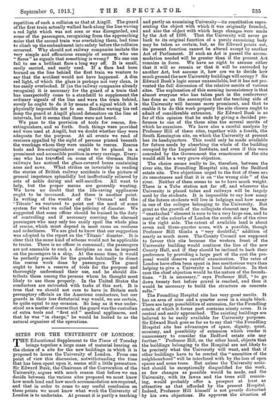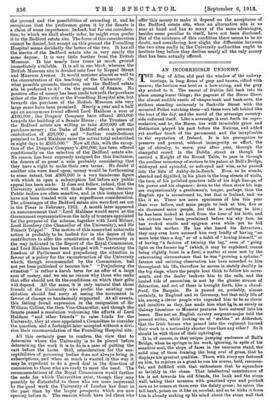SITES FOR THE UNIVERSITY OF LONDON.
THE Educational Supplement to the Times of Tuesday brings together a large mass of material bearing on the choice of a site for the new buildings in which it is proposed to house the University of London. _ From one point of view this discussion, notwithstanding the time that has been spent upon it, seems still a little premature. Sir Edward Busk, the Chairman of the Convocation of the University, argues with much reason that before we can decide between the various sites proposed we must know how much land and how much accommodation are required, and that in order to come to any useful conclusion on these points we must know what work the University of London is to undertake. At present it is partly a teaching and partly an examining University—its constitution repre- senting the object with which it was originally founded, and also the object with which large changes were made by the Act of 1898. That the University will never go back to its original function of a purely examining body may be taken as certain, but, as Sir Edward points out, its present function cannot be altered except by another Act of Parliament. If such an Act is passed the accom- modation needed will be greater than if the present Act remains in force. We have no right to assume either that it will so remain or that it will be succeeded by another Act, but assume it, how are we to decide how much ground the new University buildings will occupy ? Sir Edward Busk's logic seems unassailable, but it has not pre- vented the full discussion of the relative merits of various sites. The explanation of this seeming inconsistency is that almost everyone who has taken part in the controversy has done so on the assumption that the teaching side of the University will become more prominent, and that to enable it to do this work properly the site chosen ought to admit of considerable extension. Sir Edward Busk is so far of this opinion that he ends by giving a decided pre- ference to one of the three sites the several merits of which he examines. We have also a careful analysis by Professor Hill of these sites, together with a fourth, the South Kensington site, on which the University at present has its headquarters. This could only be made available for future needs by absorbing the whole of the building occupied by the Imperial Institute, and even if this were conceded by the Government the remoteness of the site would still be a very grave objection.
The choice seems really to lie, therefore, between the river site, the Foundling Hospital site, and the Bedford estate site. Two objections urged to the first of these ara its remoteness and that it is on " the wrong side " of the river. Neither of them seems to us to have much weight. There is a Tube station not far off, and wherever the University is placed tubes and railways will be largely used by the students. It is impossible to say how many of the future students will live in lodgings and how many in one of the colleges belonging to the University. But great as the growth of the collegiate element may be, the " unattached " element is sure to be a very large one, and to many of the suburbs of London the south side of the river is the right side. The extent of available land is about seven and three-quarter acres, with a possible, though Professor Hill thinks a " very doubtful," addition of nearly as much more. The County Council are supposed to favour this site because the western front of the University building would continue the line of the new County Hall, and if they should be inclined to back their preference by providing a large part of the cost the pro- posal would deserve careful examination. The rates of London have often been spent in less meritorious ways than helping to give a University a local habitation. In that case the chief objection would be the nature of the founda- tions. "It is necessary," says Professor Hill, "to go down twenty feet before gravel is reached, and then it would be necessary to build the structure on concrete rafts."
The Foundling Hospital site has very great merits. It has an area of nine and a quarter acres in a single block. There are large possibilities of extension, for the Foundling estate of which it forms part contains ninety acres. It is central and easily approached. The existing buildings are believed to be easily available for University purposes. Sir Edward Busk goes so far as to say that "the Foundling Hospital site has advantages of space, dignity, quiet, economy, and possibility of extension which render it unnecessary to consider the Bedford estate site any further." Professor Hill, on the other hand, objects that the buildings belonging to the Hospital are not likely to be precisely what the University will want, and that if other buildings have to be erected the " amenities of the neighbourhood" will be interfered with by the loss of open spaces and some trees. But unless the University archi- tect should be exceptionally disqualified for the work, as few changes as possible would be made, and the University, with its lawns and the trees still remain- ing, would probably offer a prospect at least as attractive as that afforded by the present Hospital. Indeed, Professor Hill himself is not greatly disturbed by his own objections. He approves the situation of the ground and the possibilities of extending it, and he recognizes that the preference given it by the Senate is a claim of some importance. „Indeed, but for one considera- tion, to which we shall shortly refer, he might even prefer it to the Bedford estate site. The force of this consideration cannot-be denied, but except on this ground the Foundling Hospital seems decidedly the better of the two. It has all the merits of the Bedford estate site in very nearly the same degree. It is very little further from the British Museum. It has nearly four times as much ground immediately available. It is all in one block, whereas the British Museum site is divided into four by Keppel Street and Museum Avenue. It would minister almost as well to the concentration of the teaching of the University. On what possible grounds, therefore, can the Bedford estate site be preferred to it? On the ground of finance. No positive offer of money has been made towards the purchase either of the River site or the Foundling Hospital site, but towards the purchase of the British Museum site very large sums have been promised. Nearly a year and a half ago an anonymous friend offered Lord Haldane a sum of £100,000 ; the Drapers' Company have offered £60,000 towards the building of a Senate House ; the Trustees of the Bedford estate are willing to take £50,000 off the purchase-money ; the Duke of Bedford offers a personal contribution of £25,000 ; and " further contributions promised to Lord Haldane raise the actual total subscribed in eight days to £355,000." Now all this, with the excep- tion of the Drapers' Company's £60,000, has been offered conditionally on the selection of the Bedford estate site. No reason has been expressly assigned for this limitation, the donors of so great a sum probably considering that they have a right to make their own terms. No doubt if another site were fixed upon, money would be forthcoming to some extent, but £300,000 is a very handsome figure with which to open a subscription list before any public appeal has been made. It does not follow, indeed, that the University authorities will think these figures decisive. Public bodies are often sensitive, and in this instance they have not been treated with any superfluous consideration. The advantages of the Bedford estate site were first set out in the Times in February, 1912. A month later appeared un announcement that " Lord Haldane would serve as the Government representativeon the body of trustees appointed for the purpose of the scheme, together with Lord Milner, Lord Rosebery (the Chancellor of the University), and Sir Francis Trippel." The motive of this somewhat autocratic action is probably to be looked for in the desire of the contributors to alter the constitution of the University in the way indicated in the Report of the Royal Commission, and Lord Haldane has been charged with "restricting the freedom of Parliament and prejudicing the situation iu favour of a policy for the reconstruction of the University which, though recommended by the Commission, had not yet been published or become law." "Prejudicing the situation " is rather a harsh term for an offer of a large sum of money, and we see no reason why those who make that offer should not fix the conditions on which their gifts will depend. All the same, it is only natural that those friends of the University who prefer the existing con- stitution should feel sorry at seeing the movement in favour of change so handsomely supported. At all events, this feeling found expression in the resignation of Sir William Collins, the then Vice-Chancellor, and though the Senate passed a resolution welcoming the efforts of Lord Haldane "and other friends" to raise funds for the University, they at once appointed a Committee to consider the question, and a fortnight later accepted without a divi- sion their recommendation of the Foundling Hospital site.
All this certainly goes to confirm the view that to determine where the University is to be placed before determining the work it is to do is a case of putting the cart before the horse. Still, consideration for the sus- ceptibilities of governing bodies does not always bring in subscriptions, and when so much is wanted in this way it may be expedient to do a good deal in the direction of concession to those who are ready to meet the need. The recommendations of the Royal Commission would further the ends for which Universities exist, though they may possibly be distasteful to those who are more impressed by the good work the University of Loudon has done in the past than by the larger prospects which are now opening before it. The reasons which have led those who
offer this money to make it depend on the acceptance of the Bedford estate site, when an alternative site is so near at hand and has so many of the same advantages; besides some peculiar to itself, have not been disclosed. But of the existence of this condition there seems to be no doubt, and considering how slight the difference between the two sites really is; the University authorities ought to hesitate long before they decline nearly all the only money that has been actually offered.







































 Previous page
Previous page